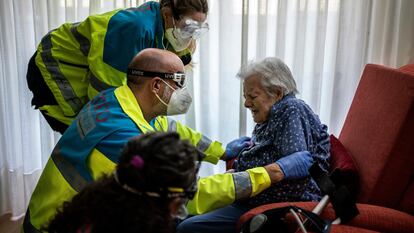Spain’s coronavirus vaccination drive: these are the 15 priority groups
Health Minister Salvador Illa has announced the categories that will be used to decide who is immunized first, with care home residents and health workers at the top of the list

The Spanish Health Ministry has classified the population into 15 groups that will have access to the coronavirus vaccine at different times. The list was made public on Friday by Health Minister Salvador Illa.
The immunization drive will be divided into three phases, coinciding with the first three quarters of the year. The first phase will target residents and staff of care homes, other healthcare workers and people with serious disabilities, for a total of around 2.5 million individuals. The ministry is hoping to complete this phase between January and March.
Phase 2 is set to cover the April-to-June period, followed by Phase 3 between July and September. No decision has been made yet on the order of who will be vaccinated in each one of these phases, but they will be members of some of the following groups:
- Adults over 64 years of age (around nine million)
- People with underlying conditions such as obesity or diabetes
- People who live or work in closed settings or communities
- People who live in vulnerable socio-economic conditions
- Essential workers
- Teachers
- Children
- Residents of areas with coronavirus outbreaks or a high incidence rate
- Pregnant women and those with nursing babies
- Immunized people who have already had Covid-19
- Teenagers, young adults and adults not included in other categories
“These groups cover the entire Spanish population. With this, decisions will be made on who is a priority group in Phases 2 and 3,” said Illa. “It will be a flexible decision, made by experts when we have more information about the vaccines and their availability. The strategy will be updated.”
The minister said that priority levels will be decided based on elements such as risk of serious morbidity or mortality, risk of spreading the virus, and the socio-economic impact of infection. There is also a possibility that some of the categories will be broken down into two separate groups, such as teenagers and young adults, or pregnant women and those with nursing babies. This could bring the total number of categories up to 18, said Illa.
The minister also reiterated that vaccination will be voluntary. For now, being vaccinated against the coronavirus has not been established as a requirement for engaging in any specific activity. Recent polls suggest that a significant number of people are not willing to get immediately vaccinated.
Following agreements between the European Union and six pharmaceutical companies (AstraZeneca, Sanofi-GSK, Janssen, BioNTech-Pfizer, CureVac and Moderna), Spain is slated to receive 140 million doses of coronavirus vaccines. Because most of these are double-dose, it will be enough for 80 million people, almost twice the population of Spain. The excess doses are meant as a reserve, to encourage production, and to help developing countries.
Care homes have been particularly hard hit by the virus. A report by the Spanish government estimated that there were 20,268 deaths from coronavirus at social services facilities for the elderly and for people with disabilities between early March and June 23, during the first wave of the pandemic.
English version by Susana Urra.
Tu suscripción se está usando en otro dispositivo
¿Quieres añadir otro usuario a tu suscripción?
Si continúas leyendo en este dispositivo, no se podrá leer en el otro.
FlechaTu suscripción se está usando en otro dispositivo y solo puedes acceder a EL PAÍS desde un dispositivo a la vez.
Si quieres compartir tu cuenta, cambia tu suscripción a la modalidad Premium, así podrás añadir otro usuario. Cada uno accederá con su propia cuenta de email, lo que os permitirá personalizar vuestra experiencia en EL PAÍS.
¿Tienes una suscripción de empresa? Accede aquí para contratar más cuentas.
En el caso de no saber quién está usando tu cuenta, te recomendamos cambiar tu contraseña aquí.
Si decides continuar compartiendo tu cuenta, este mensaje se mostrará en tu dispositivo y en el de la otra persona que está usando tu cuenta de forma indefinida, afectando a tu experiencia de lectura. Puedes consultar aquí los términos y condiciones de la suscripción digital.








































